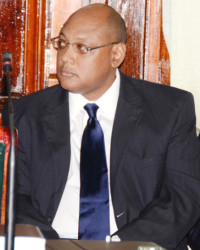Following a major oil find offshore Guyana, the country was yesterday urged to avoid the natural resources curse and Minister with responsibility for the natural resources sector, Raphael Trotman has pledged again that there will be transparency and a robust regulatory framework for the sector.
“Oil is coming, we must prepare and become adept to what is going to be bequeathed and placed into our hands. We must make the necessary efforts to ensure that in decades and centuries to come we have something to show for our sustainable utilization of our natural resources,” he told a gathering of stakeholders at the Arthur Chung Conference Centre yesterday. US oil major ExxonMobil struck what it said was a significant find in April this year, triggering a campaign by Venezuela to seek control of the area. The seminar, “Building capacity for managing the hydrocarbon sector in Guyana” was supported by the United Nations Development Programme (UNDP) and saw attendance from a wide cross-section of local stakeholders and international participants. It continues today.

According to Trotman, the policies and regulations that government is seeking to create provide clear standards and expectations for actions to be taken by those subject to regulation as well as the regulator. “This robust regulatory framework must be supported by a well-thought-out and open enforcement scheme in which regulation is applied consistently according to the criteria of a defined framework; all are intended to ensure a transparent regulatory system of the sector,” he declared.
Earlier, UN Resident Representative Khadija Musa urged that Guyana avoid the resource curse. “These resources only become a curse if there is no capacity in the country, if wrong policies are implemented and if consultation is not made throughout the community in order to develop the resources, then it becomes a curse,” she said.
The natural resource curse, also known as the “paradox of plenty,” refers to a paradoxical situation in which countries with an abundance of non-renewable resources, such as oil, experience stagnant growth or even economic contraction. The resource curse occurs as a country begins to focus all of its energies on a single industry, such as mining, and neglects other major sectors.
Musa yesterday said that this does not have to be the case in Guyana and pointed to several Middle Eastern countries that have used their natural resources to successfully develop their human capacity.
“This could be the Switzerland of South America, you have a lot,” she asserted.

However, she noted that the country’s porous borders could be a problem. “Guyana has open borders which is a bit of a minus because some of the natural resources such as gold bleed through borders which are really huge because Guyana does not have a huge army but those things can be taken care of …,” the UNDP rep said.
She pointed out that Guyana has an opportunity to begin on the right foot and not be part of the countries that are cursed. “A curse is not automatic,” Musa declared.
She noted that Guyana has begun to educate not only its civil servants but also the public and would reach out to civil society. She pledged the UNDP’s support and said that the agency looks forward to working with Guyana to making the right decisions, developing the right skills and going forward in this sector in the right way so that the country does not become a part of the curse. She also highlighted the various countries in which the UNDP is working in the extractive sector and added that the agency is bringing lessons learnt and experience from all of these countries which Guyana can take advantage of.
Proactive
Meantime, Trotman said that preparation for the development of a full-fledged hydrocarbon sector will take many years and requires a strengthening of institutional frameworks not only within the natural resources sector but also in the spheres of business services, foreign affairs, the justice and education systems, social protection, and the environment, among others.
He said that as recent oil price fluctuations and its impact have shown, managing a new extractive industry is a major challenge for many governments in the developing world. He vowed that this will not happen here. The minister added that forecasts of higher world energy demand and oil prices indicate that Guyana can benefit.
“But it also raises a number of issues with which the country must treat responsibly, embracing a new world order that expects transparency in the management processes and equity in the sharing of natural resources as equally as it demands respect for the environment and a lessening of global warming and the movement towards the greening of the economy which is an inevitability whose time has come,” he said. Therefore, the development of the hydrocarbon sector must be implemented on the basis of the country-specific political and socio-economic context while drawing on the experiences, lessons and policy recommendations from seasoned experts and practitioners, he added.
According to Trotman, Guyana is being very proactive in its approach to this emerging sector to ensure that all mechanisms necessary for the effective management and the best outcomes for its people are in place even before the first barrel of oil is brought to the surface, refined and sold.
The minister said that development of the oil and gas sector is notorious for the risks and threats that it poses to economic, social and political stability, and the environment and good governance and astute management of the sector is a major challenge for governments and domestic institutions. He said that governments must put in place institutions and regulatory frameworks that allow for transparent and efficient management of oil revenue and oil windfall should be directed towards productive investments in social and human capital to prevent economic distortions and the resource curse.
The minister highlighted that the Extractive Industries Transparency Initiative (EITI) is one international mechanism that seeks to ensure the transparency in the management of the extractive industries and joining the initiative is currently at the top of government’s agenda. He pointed out that a focal point and group of stakeholders have already started to be engaged to take Guyana’s efforts forward. He also said that Guyana wants to join the Open Government Part-nership that promotes similar ideals of transparency, and the sharing of information. Trotman this week attended a meeting of the Partnership in Mexico. Guyana has lagged on its commitment to become a part of EITI.
The minister added that at the macro level, Guyana’s priorities are being aligned with its commitment to international obligations and responsibilities for the post-2015 developmental agenda and government embraces the Sustainable Development Goals.
“We have demonstrated our willingness to take advice and support by embracing not only UNDP, but also the Commonwealth Secretariat… with their support in the development of our Draft National Upstream Oil and Gas Policy; the Canadian Government’s offer of the depth of resources available in the University of Calgary to guide the development of a Sovereign Wealth Fund…and the United States Government’s support through the Energy Governance and Capacity Initiative(EGCI),” he said while also highlighting an offer of experts and training from the Mexican government.
“Recognising the mandate given to this government, I consider it important to note that against all opposition foreign or otherwise we will not surrender, we will not shirk our responsibility and neither will we be counted as cowardly `sell outs.’ We regard our responsibility as a sacred one entrusted into our hands to act as guardian and stewards over the affairs of state and the national patrimony of the Cooperative Republic of Guyana,” he said.
“We promise as a government to be responsible, to be open, and to share information with the stakeholders and citizens alike as we embark on this odyssey of extracting, regulating, sharing and preserving the resources of this beautiful and green land of Guyana,” Trotman added.





